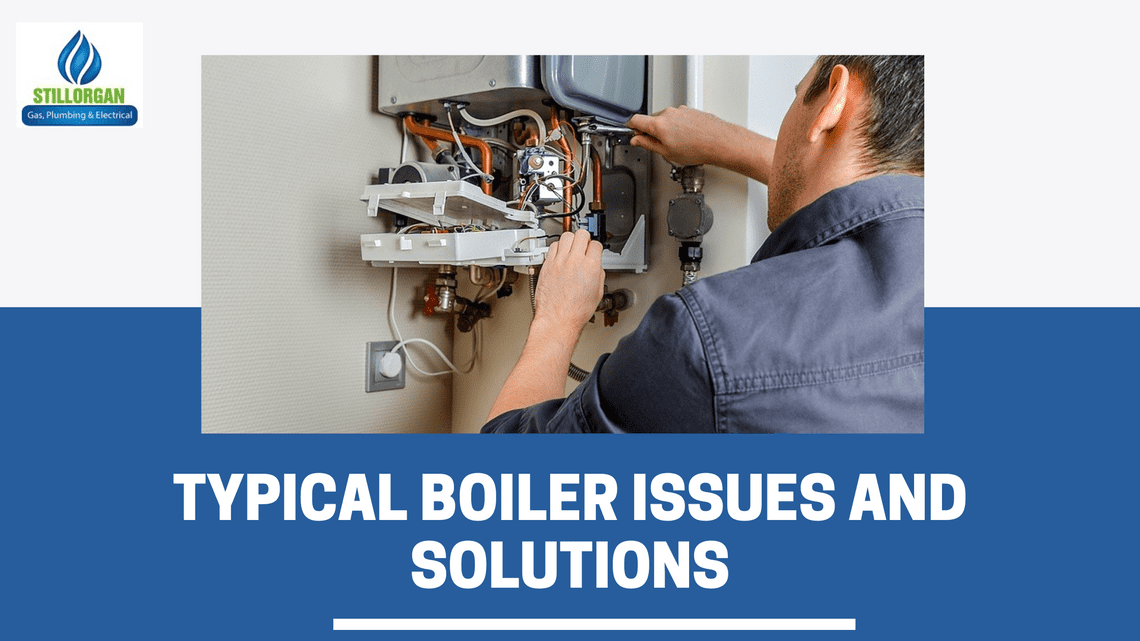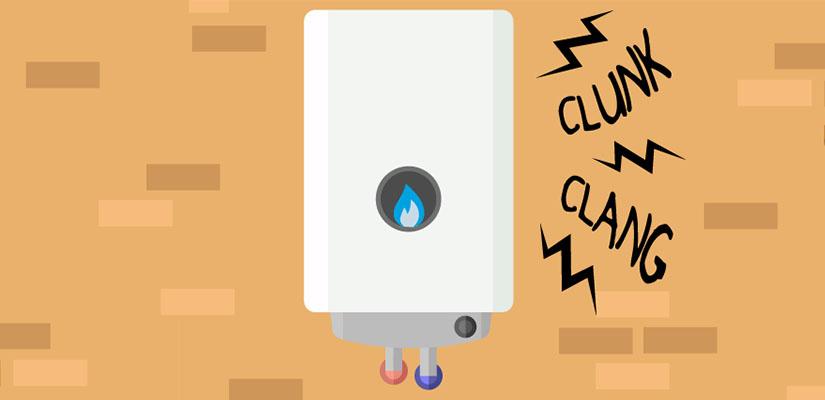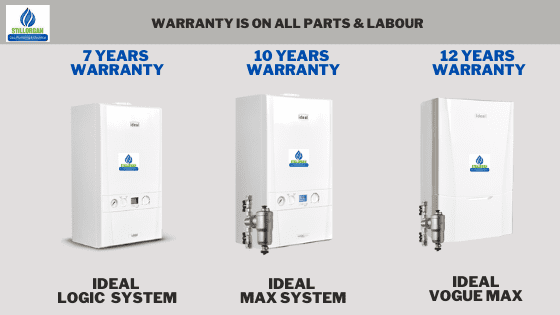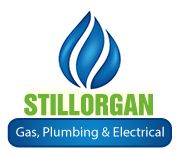
31/08/2022 by Stillorgan Gas, Plumbing & Electrical 0 Comments
Typical Boiler Issues and Solutions
With the exception of its yearly maintenance, the boiler typically sits neatly in the utility room or kitchen cupboard. Therefore, it is not surprising that the typical homeowner may not be aware of what is happening inside the boiler casing, which is a shiny white exterior. In the event that something does go wrong, it's important to understand the difference between minor problems that may be resolved on your own and errors that require you to call your installation or service specialist.
Here are a few of the most frequent questions we get daily (especially as the season's change):
1. No hot water or heating

Your boiler ought to be able to supply your house with hot water and heat. If you discover that it is incapable of either, you should have it fixed as soon as you can. No single problem can cause your boiler to stop producing heat or hot water. Verify that power is being provided to the boiler before drawing any judgments about potential issues.
We can start investigating potential problems if your boiler is getting power. Should assist you in identifying the problem's cause, your boiler needs to display an error code. However, to offer you some examples of potential problems
· Fuel isn't getting inside your house. Make sure your gas supplier is still supplying fuel if you have a gas boiler. Make sure the storage tank has enough fuel if you have an oil boiler.
· Double-check the thermostat's settings and raise the room's temperature to the desired level.
· The condensate pipe needs to be defrosted because it has frozen (more on this later in the article).
Check that the boiler pressure is set by the manufacturer's instructions (often between 1 and 2 on the pressure gauge) because there is low boiler pressure. Check out our blog for boiler fault codes here
· Pilot lights will be present on older boilers (a small flame that constantly burns before lighting a larger flame when heating or hot water is needed). The boiler won't be able to start if the pilot light burns out.
2. Hot water but no heating

Your home's central heating and domestic hot water should be provided by a boiler. There is an issue if you discover that your faucets are producing hot water but your central heating is not.
Check to ensure that your thermostat is operational when you don't have central heating before determining whether the boiler pressure is too low.
With the aid of a thermostat, you can regulate the central heating's temperature as well as when it should turn on. Check the settings again if the heating hasn't turned on when it should have.
The pressure of the hot water flowing through the central heating system is referred to as boiler pressure. The central heating won't operate if the boiler pressure falls too low.
You can increase the boiler pressure without contacting a heating engineer (take a look at our simple guide here). However, don't hesitate to get in touch with a specialist if you're even the slightest bit uncertain.
There are more possibilities for why you can have domestic hot water but no heating besides thermostat issues and low boiler pressure. However, this is where things, unfortunately, become a little more complicated.
If your thermostat is working properly and the boiler pressure is sufficient, there may be a problem that has to be fixed by a qualified technician. Common reasons for hot water but no heating include faulty motorized valves, broken diaphragms, and airlocks.
The diverter valve in heating systems with combi boilers could not be working properly. Combi boilers deliver hot water and heating on demand, and the diverter valve controls whether the hot water goes to the outlets or the radiators. You might have hot water but no heating if it becomes stuck, or the other way around.
A Gas Safe certified engineer can identify malfunctioning diaphragms, airlocks, motorized valves, or diverter valves, perform the required repairs, or replace damaged components.
3. Boiler keeps starting and stopping

If your boiler repeatedly starts and stops, there may be an obstruction in the system or a buildup of limescale.
The issue might also arise if your boiler has an automated bypass valve. When the boiler is not in use, this valve permits water to pass through, and if it is malfunctioning, the boiler may repeatedly start and stop.
Calling our boiler repair professional, who can identify the issue and carry out the required fixes, is the best course of action for solving this problem.
4. A frozen condensate pipe
Condensate pipes transfer the water from the boiler and are found in condensing boilers. This typically drains outside into a drain, where there is a chance of freezing.
If your condensate line freezes, your boiler will frequently have a fault code or warning signal, for example. On a boiler made by Ideal Logic, the code is L2.
5. The Vent is blocked / Your boiler won’t ignite

An obstruction in the vent is another typical cause of your boiler, not lighting. If this is the case, your boiler will display a warning message, such as the code L2 on Ideal boilers. This frequently occurs in the fall and winter when leaves may obstruct the vent. This problem can be resolved by simply cleaning the area around the vent of all debris.
6. Noisy boiler (e.g. banging, whistling, gurgling)

A heating system can create a variety of noises, ranging from banging and clanging to whistles and gurgles, due to a variety of causes.
Don't overlook a noise emanating from the boiler or heating system because it probably indicates a problem. Depending on the kind of sound and its source, the possible fault will change. Below, we've included a few typical boiler noises to assist you in determining the reasons:
· Boiler making whistling sound:
Kettle-like noises brought on by a buildup of sludge on the heat exchanger have already been discussed.
· Banging noise from the Boiler -
Banging may also be the result of debris accumulating on the heat exchanger. Banging is frequently brought on by pipework or a loose internal component. Some pounding sounds might be a sign that the pump, which circulates hot water from the boiler throughout the central heating system, is on the verge of failing.
· Clanking noise from the boiler –
Clanging, which is not too unlike banging, may once more be the result of faulty plumbing. Alternately, it can imply that anything is blocking the boiler fan.
· Buzzing -
A buzzing sound could indicate that the boiler's electrical components are broken and should probably be replaced. If the thermostat is the source of the noise, it may be necessary to replace the conductor if it is unclean.
· Humming -
Boilers often produce a modest humming sound during operation; for the quietest models, search for boilers that have received the Quiet Mark accreditation; however, a loud humming could indicate a loose component (most likely the central heating pump).
· Gurgling -
A build-up of air in the pipes might result in obstructions that stop the water from moving freely around the heating system. If you can hear this near a radiator, they probably need to be bled.
7. Boiler is Kettling
Hearing an odd rumbling sound that sounds like a kettle boiling? A condition known as kettling can occur when lime scale or sludge accumulates on the heat exchanger in your boiler (a coil that transports heat from the fuel to the water that will circulate the heating system).
Your boiler's accumulation of debris may hinder the flow of water via the heat exchanger. This could overheat the water and cause it to steam and boil, producing sounds akin to a kettle.
Although kettling is more frequent in locations with hard water, it can also impact boilers in areas with soft water. It can limit the lifespan of the system and make your boiler work harder, costing you more to operate.
It is advisable to call a Gas Safe registered engineer if your boiler is kettling. To get rid of the accumulation of these deposits and make sure the system is functioning properly once more, the engineer will probably flush out your system.
8. Boiler is leaking

It's never a good sign if your boiler is dripping. Additionally, the source of the water will affect the leak's cause. Turn off the central heating and the water supply before attempting to find the source of the leak. It's crucial to remember that you should never try to fix a boiler leak on your own; instead, you should call a Gas Safe qualified expert.
An internal component that has broken, like a pressure valve or pump seal, is the most frequent reason for a boiler to leak. The boiler pressure may be too high if the leak is coming from the pressure valve. In the meanwhile, if the pump seal leaks, it may be worn out and need to be replaced. If the boiler is leaking near the pipes or tank, corrosion is almost certainly the cause. Otherwise, a subpar installation can be the blame. In any case, we advise getting in touch with an engineer who can find the leak and fix it.
9. Boiler pilot light has gone out
Professionals should perform this task. You shouldn't try to relight a boiler pilot light unless you have experience with boilers, so call Stillorgan Gas Pluming & Electrical right away.
How long does a boiler last?
Most boilers come with warranties that are good for at least five years. A boiler's predicted lifespan can be substantially longer, and if you have Stillorgan Gas Plumbing and Electrical periodically service the boiler, you could get 10 to 20 years out of it. Making sure boiler repair is done as soon as it's required will help lengthen the boiler's lifespan because it won't be trying to function with broken or faulty parts. Look after your boiler, and it will look after you, to save yourself the trouble and time of searching for "boiler repair near me," "emergency boiler repair Dublin," "boiler repairs Dublin," "gas boiler repair," and "oil boiler repair Dublin."
Could you need a boiler replacement?

Sometimes repairing a boiler is not a wise financial decision. It would be far more cost-effective to replace the boiler.
Boilers lose dependability and are more prone to require repairs more frequently as they get older. When the cost of boiler repairs starts to mount, replacing the boiler will be your best course of action.
Depending on the type of boiler being built, new boiler installation prices can range from approximately €1,500 to €3,500. These costs just cover the installation and boiler; any other heating system modifications would incur an additional fee. Making the longer-term investment in a new boiler makes sense when you take into account that some replacement parts can cost several hundred pounds.
You should think about replacing your boiler. If your boiler is more than eight years old, if it frequently breaks down, if professionals have a hard time finding replacement parts, or if your heating costs are going up.
Modern boilers have a guarantee period and are far more dependable than earlier models. A warranty will ensure that the manufacturer will cover you in the case of a problem (according to terms and restrictions), which could help you save money. A new boiler will also improve the effectiveness of your heating system, resulting in decreased heating costs. Check out our blog post on Gas Boiler Replacements: The Costs, Benefits and Reasons Why You Should Upgrade Your System.
A Gas Safe licensed engineer must replace a boiler, just like they must for the vast majority of boiler repairs. Heating engineers from every part of Dublin are part of our network. Get a free estimate on your boiler replacement by calling (087) 460 8501 or sending an email to info@stillorgangas.ie.

Comments
Leave a comment